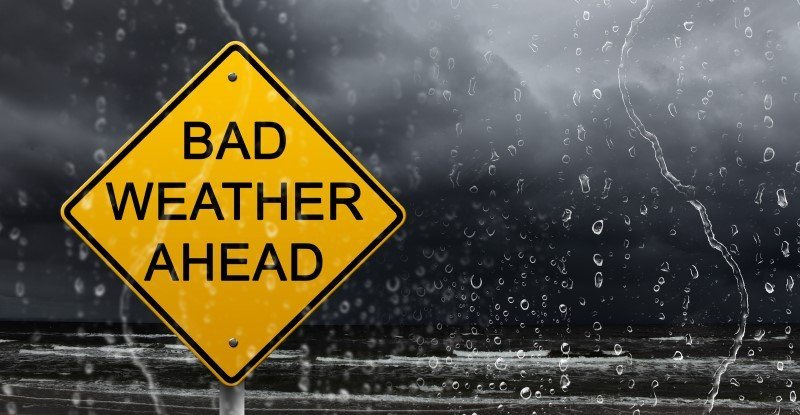
Updated November 24, 2022
The increased frequency of extreme weather events threatens to put further strain on healthcare organizations still recovering from the impacts of the COVID-19 pandemic.
In 2021, the US experienced the second-highest number of weather and climate disasters in a calendar year, behind only 2020. Analysts report that the number and cost of these disasters are on the rise.
Hospitals and healthcare facilities are especially vulnerable. The strain on operational efficiency, high levels of staff burnout and significant financial downturn are part of the lasting impact of COVID-19 on the healthcare system.
It’s critical for leadership to effectively communicate with healthcare workers during times of extreme or inclement weather conditions. These are the steps hospitals and other facilities should take before, during and after an event to minimize risk and protect lives.
Contents:
Creating an Inclement Weather Policy

Source: National Oceanic and Atmospheric Administration (NOAA)
Defining Essential Employees
In the healthcare industry it is critical to define which roles are required to continue patient care and perform vital hospital services during inclement weather situations.
These roles and the expectations on them should be outlined in an inclement weather policy (see below). This should detail if employees are expected to remain at home or report to the workplace, what transportation services available to them and how their compensation may be affected.
In larger hospitals, it may be necessary to create different policies for different departments. For example, one policy for surgical staff and a separate policy for administrative teams.
All employees should be taken through the policy during their onboarding, as well as having follow-up training before hurricane and winter seasons each year.

Creating an Inclement Weather Policy
An inclement weather policy for hospitals should define the specific events which are considered inclement weather. These will be events which threaten the continuation of patient care services, such as hurricanes, snow, tornadoes and flooding.
It should also define which essential staff are expected to report for duty as normal during the event, both by role type (for example, nursing staff, administrative staff etc.) and employment status (that is, only permanent staff or also contract staff).
Other areas your policy should address include:
- Which staff should attempt to come to work
- What arrangements staff should make if expected to work for an extended shift
- How staff should notify managers if unable to report for work
- How their job and/or remuneration may be affected
- Where to go for local weather information or hospital updates
- General advice for staff to keep themselves safe
1. Before – Be Prepared
Having an effective emergency communication plan during this challenging time is essential to cascade important status updates, provide instructions around evacuation procedures and check on employee welfare.
Follow these key actions to increase preparedness for inclement weather events at your healthcare facility:
- Prepare an emergency communication plan, defining the messages to be sent, the recipients and the coordinators.
- Create a series of pre-configured messages that can be triggered to send instantly. For example, instructions for staff to “Evacuate immediately”.
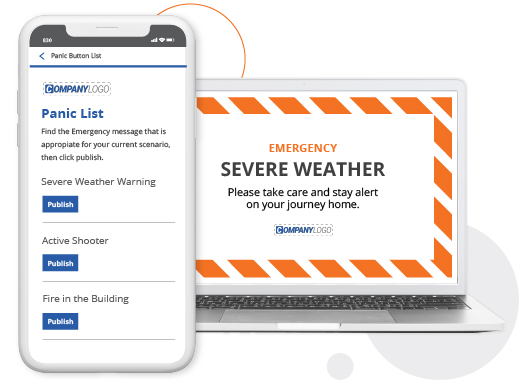
- Maintain an up-to-date staff contact list to ensure no-one is left out, paying particular attention to any mobile, remote or contract staff.
- Define the communication tree so that it’s clear who’s ultimately responsible for publishing content.
- Ensure your emergency communication plan is available to all employees in advance and make it a compliance requirement that they read it. Promote key messages and remind staff of where resources may be accessed through corporate wallpapers or a series of screensavers.
- Rehearse the communication process so that in the hour of need, any confusion is avoided.
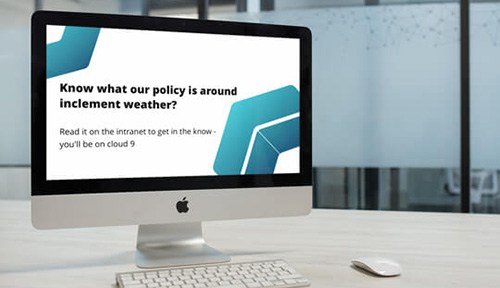
2. During – Be Decisive
When an extreme weather event strikes, healthcare workers need up-to-the-minute information from a single, reliable source that they trust. Managers must be able to communicate with staff effectively, quickly and with guaranteed success.
The following actions will ensure employees are safe, workplaces are protected, and risks are minimized when the worst happens.
- Utilize all available internal communication channels to ‘flood’ your message. Use high-impact Alerts for maximum visibility, but follow these up with SMS, digital signage, social media and other channels to ensure your message gets through.
- Repeat, repeat, repeat. Message recurrence is recommended to ensure important information gets through if staff are busy or distracted. Make sure to provide clear, simple instructions and include any links to more detailed information, such as on your organization’s intranet.
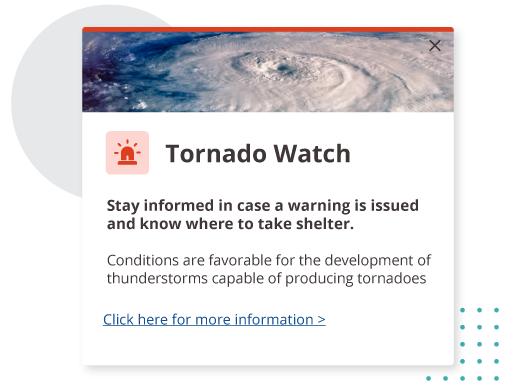
- Provide status updates through desktop tickers to keep staff informed as situations change. This scrolling newsfeed channel is highly effective at delivering time-sensitive information without being too intrusive.
- Use different colored alert templates to improve message awareness and cut-through. This visual conditioning helps staff immediately understand the nature of the message. For example, red = urgent, blue = important, green = useful.
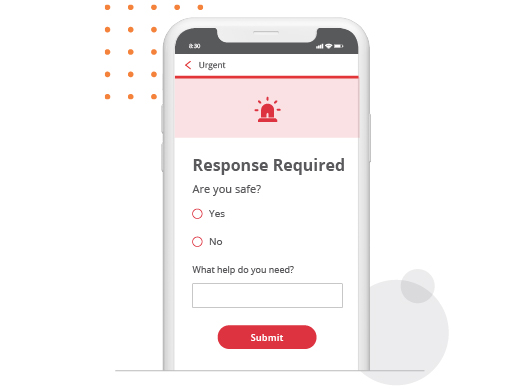
- Check on staff safety by contacting them with a message which asks them to select Yes or No if they’re safe. Response teams can then filter answers to identify if anyone needs assistance.
- Assist in the planning of support services such as childcare and parking arrangements.
Healthcare leaders can see this in action through the real life story of Holiday Inn and how they used communications to maintain a culture of calm during a major storm.

3. After – Be Informed
When the crisis is over, identify what worked well and what needs improving. If history has taught us anything, it’s that there is always a next time. Being organized for it is half the battle.
- Notify staff that the policy and crisis plan is 'deactivated'.
- Get feedback through an employee survey. Did staff feel they had the correct amount and type of information? Did they feel protected or concerned? Insights from your survey may reveal that the frequency of communications needs to be increased, or that one channel has a higher readership rate, and therefore is more effective, than others.
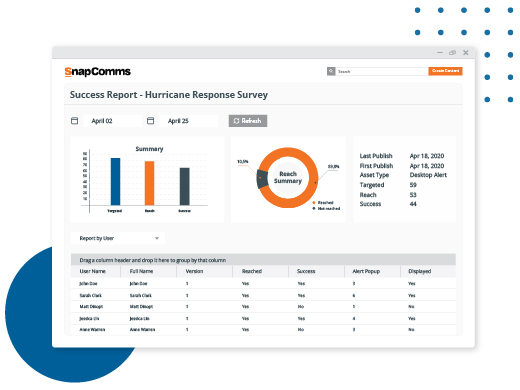
- Keep your emergency communication plan and staff contact lists up to date. Staff will continue to join and leave, remote locations may open or close, any communications coordinators may move on, taking their knowledge with them. Keeping these assets updated will ensure they’re always current, no staff are overlooked and that plans may be enacted immediately when the need arises next.
Urgency is essential when extreme weather events strike. A comprehensive emergency communications plan will help healthcare organizations be prepared and better able to weather the storm.
SnapComms can help keep your organization and people safe during inclement weather. Learn how with our range of communication solutions or speak with one of our expert team.


